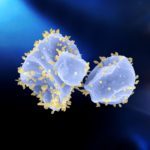Lien vers Pubmed [PMID] – 32517760
Lien DOI – 10.1186/s12915-020-00800-9
BMC Biol. 2020 Jun; 18(1): 61
Origin of DNA replication is an enigma because the replicative DNA polymerases (DNAPs) are not homologous among the three domains of life, Bacteria, Archaea, and Eukarya. The homology between the archaeal replicative DNAP (PolD) and the large subunits of the universal RNA polymerase (RNAP) responsible for transcription suggests a parsimonious evolutionary scenario. Under this model, RNAPs and replicative DNAPs evolved from a common ancestor that functioned as an RNA-dependent RNA polymerase in the RNA-protein world that predated the advent of DNA replication. The replicative DNAP of the Last Universal Cellular Ancestor (LUCA) would be the ancestor of the archaeal PolD.

